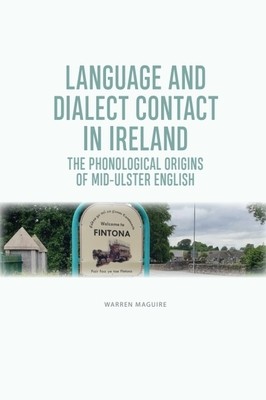
- We will send in 10–14 business days.
- Author: Warren Maguire
- Publisher: Edinburgh University Press
- ISBN-10: 1474452906
- ISBN-13: 9781474452908
- Format: 15.6 x 23.4 x 1.4 cm, hardcover
- Language: English
- SAVE -10% with code: EXTRA
Reviews
Description
Warren Maguire examines Mid-Ulster English as a key case of new dialect formation, considering the roles of language shift and dialect contact in its phonological development. He explores the different processes which led to the development of MUE through contact between dialects of English, Scots and Irish and examines the history of a wide range of consonantal and vocalic features. In addition to determining the phonological origins of MUE, Maguire shows us why the dialect developed in the way that it did and considers what the phonology of the dialect can tell us about the nature of contact between the input language varieties. In doing so, he demonstrates the kinds of analysis and techniques that can be used to explain the development of extra-territorial varieties of English and colonial dialects in complex situations of contact, and shows that Irish English provides a useful testing-ground for models of new dialect formation.As one of the oldest 'new' extra-territorial
varieties of English, one which developed in a context of language and dialect contact, MUE provides an excellent opportunity to study how new dialects develop in situations of settlement colonisation.
EXTRA 10 % discount with code: EXTRA
The promotion ends in 11d.09:30:40
The discount code is valid when purchasing from 10 €. Discounts do not stack.
- Author: Warren Maguire
- Publisher: Edinburgh University Press
- ISBN-10: 1474452906
- ISBN-13: 9781474452908
- Format: 15.6 x 23.4 x 1.4 cm, hardcover
- Language: English English
Warren Maguire examines Mid-Ulster English as a key case of new dialect formation, considering the roles of language shift and dialect contact in its phonological development. He explores the different processes which led to the development of MUE through contact between dialects of English, Scots and Irish and examines the history of a wide range of consonantal and vocalic features. In addition to determining the phonological origins of MUE, Maguire shows us why the dialect developed in the way that it did and considers what the phonology of the dialect can tell us about the nature of contact between the input language varieties. In doing so, he demonstrates the kinds of analysis and techniques that can be used to explain the development of extra-territorial varieties of English and colonial dialects in complex situations of contact, and shows that Irish English provides a useful testing-ground for models of new dialect formation.As one of the oldest 'new' extra-territorial
varieties of English, one which developed in a context of language and dialect contact, MUE provides an excellent opportunity to study how new dialects develop in situations of settlement colonisation.


Reviews